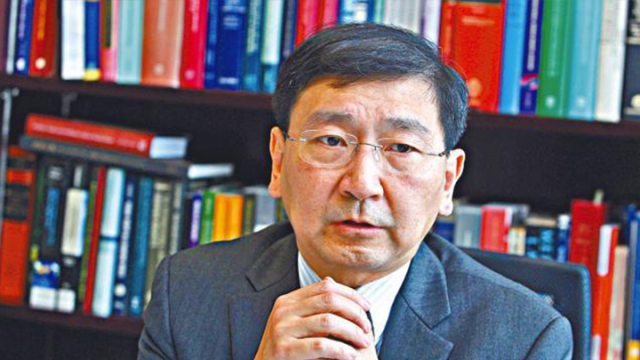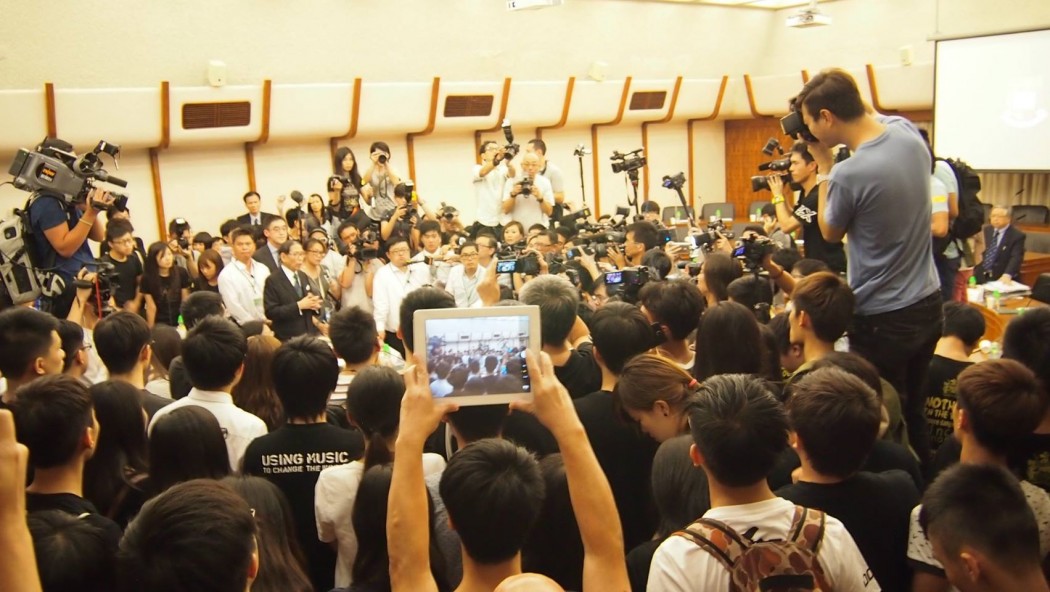The appointment of pro-democracy law scholar Johannes Chan Man-mun as pro-vice-chancellor of the University of Hong Kong (HKU) was rejected on Tuesday, after a lengthy process of deliberation and dispute that lasted more than nine months.
Who is Johannes Chan?
Chan is a top Hong Kong law scholar who was dean of the Law Faculty of HKU for 12 years. He is a renowned scholar in human rights law. He is also known for his liberal stance on political reform issues in Hong Kong.

Since pro-Beijing newspaper Wen Wei Po reported that he was recommended for the position of pro-vice chancellor of HKU in November last year, the newspaper has published more than 300 articles attacking him for ties with Occupy co-founder Benny Tai Yiu-ting, who worked as Chan’s subordinate. Other pro-Beijing newspapers joined the campaign. The two were investigated by HKU over a donation related to the pro-democracy Occupy protest.
Chan is also the first and only Honorary Senior Counsel in Hong Kong. He was appointed to the position by the then Chief Justice Andrew Li Kwok-nang in 2003 for his “distinguished service to the Law of Hong Kong”.
Read: 32-page List of publications of Johannes Chan
What is the role of pro-vice-chancellor?
The post literally means the “deputy head” of the university, reporting under the vice-chancellor and the provost. There are five positions of pro-vice-chancellors (PVC) in HKU, and Chan was selected for the role managing academic staffing and resources.
The position is mainly a re-establishment of a former post of pro-vice-chancellor (staffing) which has been left vacant for some five years, since the then PVC concerned left the University.
How was Chan first selected?
Chan was unanimously recommended to the HKU Council by the selection committee headed by the Vice-Chancellor Peter Mathieson in December 2014.
The Council was then required to decide whether to appoint him.

Who are the HKU Council?
Council chairman Edward Leong Che-hung, doctor
Vice-Chancellor Peter Mathieson
Six members appointed by the Chief Executive Leung Chun-ying:
Benjamin Hung Pi-cheng, CEO of Standard Chartered Bank
Leonie Ki Man-fung, former deputy director of Leung Chun-ying’s campaign office; non-executive director of New World Development; CPPCC deputy
Ayesha Lau, partner, KPMG; wife of Lawrence Lau, former vice-chancellor of Chinese University of Hong Kong (CUHK)
Arthur Li Kwok-cheung, former education minister and former vice-chancellor of CUHK; CPPCC deputy
Martin Liao Cheung-kong, lawmaker; NPC deputy
Margaret Leung Ko May-yee, deputy chairman, Chong Hing Bank; CPPCC deputy
Four members appointed by the Council:
Edward Chen Kwan-yiu, former vice-chancellor of Lingnan University
Abraham Shek Lai-him, lawmaker; CPPCC deputy
Wong Kai-man, independent non-executive director of China Construction Bank and of SCMP Group
Peter Wong King-keung, CPPCC deputy
(and two vacancies)
Two members who were not students or staff elected by the court of HKU:
Man Cheuk-fei, veteran journalist
Rosanna Wong Yick-ming, executive director of Hong Kong Federation of Youth Groups; CPPCC deputy
Four full-time teachers and one full-time non-teacher employee elected:
Professor Cheung Kie-chung
Professor Kwok Sun
Professor Lo Chung-mau
Professor Yuen Kwok-yung (resigned but staying until his vacancy is filled)
Felix Ng Kwok-yan
Two elected student representatives:
Billy Fung Jing-en, HKU Student Union president
Aloysius Wilfred Raj Arokiaraj, Postgraduate Student Association president (resigned but staying until his vacancy is filled)

Why was the decision to appoint Johannes Chan delayed?
In June, the Council decided that the appointment of the pro-vice-chancellor would have to wait until the new provost had been put in place – a decision that sparked controversy.
In July, around 50 students charged into a Council meeting, following news that the governing body had decided to uphold a decision to delay the appointment of Chan. Two council members were hospitalised in the ensuing confusion.
In early September, alumni of HKU called an Extraordinary General Meeting of the Convocation. They voted overwhelmingly in favour of confirming the recommendation of Chan to the pro-vice chancellorship, with 7,821 out of 9,298 votes, among other passed motions. However, the vote is only symbolic and is not binding.
Why was he rejected?
The discussion of the Council on Tuesday night was confidential. Officially no reason was given by the Council.
However, in a move that contravened the Council’s confidentiality rules, HKU Student Union president and student representative to Council Billy Fung Jing-en released a statement, to give an account of Council members’ reasoning behind their decision.
Arthur Li Kwok-cheung criticised Chan’s lack of a doctoral degree and thus his inability to serve as pro-vice chancellor.
Martin Liao Cheung-kong said his decision was based on the fact that Google Scholar results showed Chan’s research had only been searched for “four times in the past five years.”
Leonie Ki Man-fung and Margaret Leung Ko May-yee also commented that “any applicant with such a high profile should never be hired.”
Rosanna Wong Yick-ming said that “appointing Professor Chan to the position of PVC would only cause a further division of the University.”
Lo Chung-mau also accused Chan of “not showing sympathy when [he] fell” during an earlier Council meeting.
Many also questioned Chan’s integrity.
Council chairman Edward Leong Che-hung did not cast a vote.

Why is his rejection significant?
Johannes Chan and Benny Tai had said that it was hard for people not to suspect there was political interference involved.
Chan also questioned how HKU can maintain its international reputation, and how to convince job applicants that the hiring process does not put political views into consideration.
Are there grounds for a judicial review?
Chan said there were previous court cases concerning administrative law indicating that if a statuary body made a decision based on reasons they should not consider, there will be grounds for a judiciary review.
However, he said would not consider filing a judiciary review against the Council’s decision now; doing so would hurt HKU more.

How did the students react to Tuesday’s news?
Hong Kong University Students’ Union wrote on their Facebook page: “In view of such injustice and unfairness, the Hong Kong University Students’ Union strongly denounces these traitors in the Council. We shall also seek legal advice and apply for judicial review in order to restore justice to this institution.”
They demanded that:
1. All Council members shall report and explain their choices of votes.
2. All 12 members who cast votes against the appointment shall resign from their positions.
3. Leong Che-hung shall be accountable for the issue and step down, resigning from the position of the Chairperson of the Council. He shall also apologise for his mistakes in the Council.
4. The University shall promise a review to the composition of the Council and increase the proportion of university members.
The Hong Kong Federation of Students has issued a statement criticising the HKU Council decision.
It said, “the Hong Kong Communist administration has brazenly invaded Hong Kong’s higher education, that political suppression of academia is now a fact.”
“In the current abnormal formation of the HKU Council, Chief Executive Leung Chun-ying can appoint many people in his camp as Council members, to manipulate appointments of officials, administrative arrangements and the teaching approach of HKU… This colonial system is a humiliation to the spirit of the university and should be abolished.”

How did the pro-Beijing media react?
Pro-Beijing newspaper Wen Wei Po published ten reports on the Johannes Chan incident on Wednesday. Two of the stories were titled “The five guilts of Johannes Chan” and “Multiple exclusive exposé of Johannes Chan as this newspaper [Wen Wei Po] served justice.”
Chinese nationalistic newspaper Global Times has joined Hong Kong pro-government newspapers in slamming Chan, whom they claim was an Occupy Central “ringleader.” The result of the anonymous vote reflected “the will of the people”, the paper said.
What will happen next?
Chan will continue to work at HKU.
A new search committee will be formed by the vice-chancellor of HKU Peter Mathieson. Technically, he can recommend Chan as pro-vice chancellor once again.
On Commercial Radio, Lawmaker Ip Kin-yuen said that the HKU Alumni Concern Group will be hosting a forum to discuss the HKU Council’s decision to reject the appointment of Chan. Council chairman Edward Leong Che-hung agreed to attend on Tuesday before the meeting.
